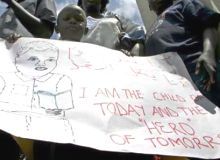UN adopts resolution on Sudan, slammed by aid agencies as ‘weak’
NAIROBI, Nov 19 (AFP) — The Khartoum government and rebels Friday pledged to sign a final accord ending a two-decade war in southern Sudan by the end of the year, as the UN Security Council unanimously adopted a resolution pushing for peace in the war-ravaged country.

|
|
A Sudanese refugee child in Kenya holds a banner during a demonstration in support of the U.N. Security Council meeting in Nairobi November 19, 2004. (Reuters). |
But the resolution was immediately slammed by aid agencies as weak and wrong-headed, for failing to lay down tough sanctions if the violence in a separate conflict in the west Sudan region of Darfur is not halted.
Resolution 1574 specifically urges the Khartoum government and southern rebel Sudan People’s Liberation Movement/Army (SPLM/A) to make good on their pledge to sign a comprehensive deal by December 31.
The war has raged since 1983 and cost 1.5 million lives. Some four million people have been displaced.
The resolution dangles the prospect of massive development aid once the deal is struck, and suggests its signing would help to bring peace to other areas of Sudan, notably Darfur, which is now suffering from what the UN terms the world’s worst humanitarian crisis.
The resolution, adopted in the council’s first meeting outside its New York headquarters since 1990, demanded that government and rebel forces in Darfur, where war erupted in February 2003, “cease all violence and attacks, including abduction (and) refrain from forcible relocation of civilians.”
But it removed a direct threat of sanctions against Khartoum if it failed to end the violence and did not echo the widely accepted notion that the government is to blame for most of the abuses in Darfur.
The international aid agency Oxfam was quick to slam the resolution, as “weak” and “dithering”.
“Instead of responding to the ongoing (Darfur) crisis with concrete action, the Security Council could only agree to ‘monitor compliance’ with previous resolutions,” Oxfam said in a statement.
“For the people of Darfur, ‘monitoring compliance’ has become UN speak for more death and suffering,” the statement added.
Tens of thousands of people have been killed in the Darfur conflict and at least 1.6 million displaced.
Human Rights Watch (HRW) said: “We fear that the government of Sudan will take this resolution as a blank cheque to continue its persecution of the civilian population in Darfur.”
Amnesty International repeated its call for a mandatory arms embargo to be imposed on Sudan to prevent ostensibly legally imported weapons being used to commit war crimes in Darfur.
Dozens of refugees demonstrated outside the UN’s Nairobi headquarters to protest the resolution.
“What Khartoum needs is tough sanctions like those that were imposed on Iraq. They need trade sanctions, arms sanctions and any other that may threaten to weaken that government,” said demonstrator Emmanuel Deng.
The council’s president, US Ambassador John Danforth, an old Sudan hand and the driving force behind the current initiative, rejected the criticism, stressing the real responsibility for bringing peace to Sudan lay with its warring parties.
“Some are already saying, ‘oh just another resolution,’ … and that this whole event is just a photo opportunity… an illusion (and that) in the meantime… the atrocities in Darfur continue,” he told the council.
But turning to address Sudanese Vice President Ali Osman Taha and SPLM/A leader John Garang, he said: “It is up to you to prove the naysayers and skeptics wrong and move your country forward to joining the family of nations.”
“The attention of the world is upon you. The United Nations and all the nations of the world expect, demand, that you deliver on your word.”
After taking stock of the situation in Somalia and efforts there to install the first functioning government in more than a decade, the Council closed the Nairobi session.
On Saturday, delegations from all 15 member states are due to embark on a week-long tour taking in Democratic Republic of Congo, Rwanda, Burundi and Uganda.
